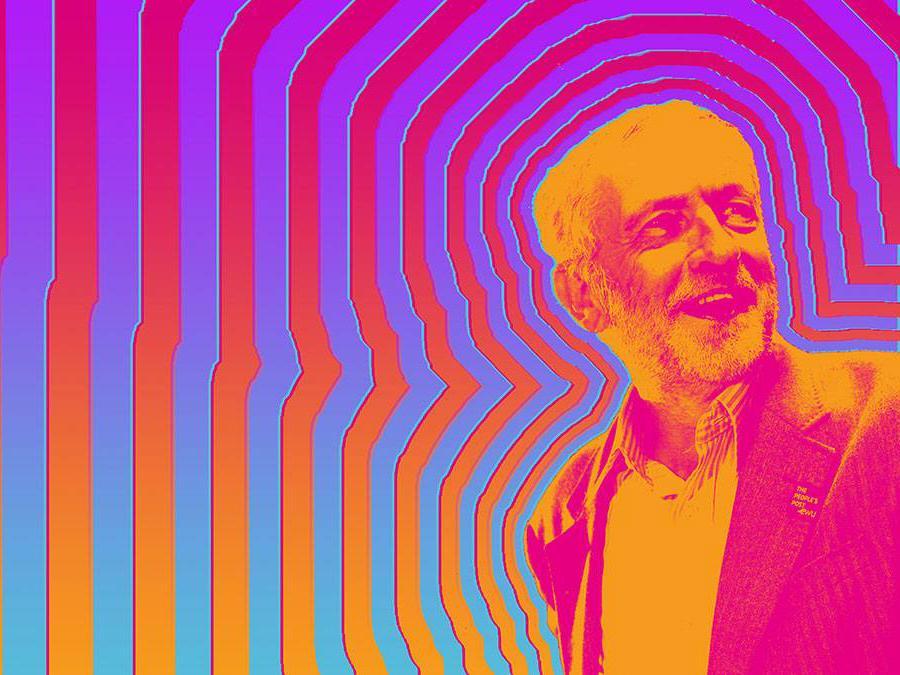Why Acid Corbynism is the new counterculture we need
In the second part of a series exploring utopian ideas, cultural theorist Jeremy Gilbert tells Casper Hughes that 1960s and 1970s thinking should be blended with the current energies from the left to forge a new political consciousness


First coined by a Labour activist trying to best describe his politics to a friend in a nightclub, Acid Corbynism is partly inspired by the late Mark Fisher’s unfinished book Acid Communism, later becoming immortalised as the topic of a discussion at Labour Party fringe conference The World Transformed. Now sections of the party are looking to develop the idea, discussing ways in which a Corbyn project can engender new forms of collective consciousness informed by countercultural projects of the past. Jeremy Gilbert, professor of cultural and political theory at the University of East London, outlines the vision.
What’s the problem?
In Tony Blair’s speeches in 2000, he made it clear that to live in the modern world one must subject yourself to the market. There was huge pressure to just experience yourself as this atomised individual who isn’t connected to anyone, who can’t find any satisfaction in the community, or in work, or in politics, who can only really find any sense of autonomy in the private sphere.
Even though it was such a short time ago, it’s hard to remember how stifling the atmosphere was in Labour from 1988 until two years ago. The traumatic experience of the 1980s led a whole generation of Labour Party politicians to believe that if you are seen in any way to ally yourself with any culture that isn’t mainstream, Top 40 chart pop, EastEnders, football, then people would hate you and you’d lose.
The millennial generation can recognise the strategy that started in the mid-Eighties, which was wearing smart blue suits, never saying anything the Confederation of British Industry (CBI) wouldn’t be enthused by, never admitting to being interested in anything more radical than EastEnders, got us where we are today. And that’s clearly f***ed.
What’s the solution?
Most people intuitively know – and neuroscience and sociology make clear – we are dependent upon one another to survive and thrive, and aren’t in fact autonomous, separate individuals. Yet we live in a society where the social relations and the way the economy works make it very difficult to behave in a way which isn’t individualistic.
Part of what Acid Corbynism is about is finding ways of exploring what it would mean in cultural and political terms to really act like you’re conscious of that. On a philosophical level, I’m part of a tradition which is very sceptical of the whole liberal, European view of the self. If you accept that the bourgeois, individual subject is a myth, the European tradition is to be a revolutionary and the Buddhist tradition says you should give up all your possessions and live in a monastery. They’re quite different but there’s a whole terrain in between to explore. I don’t think we would so hubristic as to think we could be that point of conversion but we would want to create a space where people explore those kinds of ideas.
What’s the inspiration?
Before Blair, especially in the Nye Bevan/Tony Benn tradition there was always a sense that our enemy wasn’t just the Tories, but a whole culture and whole cultural hierarchy, and anything that was opposed to that we should be sympathetic to. In the 1960s and 1970s, for the first time you have a generation not growing up worrying about how to feed their children. The consequence of that are people start to ask, why given they no longer have to experience scarcity, why they have to continue to experience any degree of exploitation.
Within the counterculture of that era, there was a relationship between music culture, hippy culture, drug culture and these burgeoning political movements. The Grateful Dead, James Brown and the Black Panthers were all linked. In their different ways, the musical tendencies, psychedelic culture and communes of the time all rejected conformist conservatism and competitive individualism. What they all celebrated was an idea of collective freedom.
What's the relationship with psychedelics?
Broadly speaking psychedelics are only part of a range of technologies, including music, yoga, political organisation, which people can use to try and transform their consciousness. We would ally ourselves with experimentation but don’t want to be prescriptive. However, there’s clearly a big body of evidence that meditation and psychedelics have really potent therapeutic uses.
Part of Mark’s thinking, and that of lots of other traditions, was that clinical depression is just extreme alienation in some senses. A depressed person can not be an effective activist, a depressed person can not be an effective citizen, so it becomes politically urgent to find ways of helping and treating those people.
There’s still a kind of hippyphobia on the left, a residual scepticism of anything connected to Asian philosophy, but you can’t understand the brain if you have nothing to say about meditation and tripping.
What would a 21st century counterculture look like?
I don’t know the answers yet but whatever’s going to emerge next, it has to involve social media platforms that are less limited than Facebook. During the election campaign, there were lots of people involved in the campaigning for Corbyn, using apps and being involved in their community. Thousands of people were able to go out and talk to people on their street about politics. That is extremely potent and empowering.
Every political project will implicitly have an ideal human in mind. Thatcher wanted to create entrepreneurial, hard working individuals. Without imposing a template, we would want to develop humans who would find it easy to collaborate with others in a creative way in as many contexts as possible, without paranoia and fear. Someone who’s comfortable with their own complexity and the complexity of the society they live in.
If you have a utopian idea that needs to be heard, why don’t you get in touch? Send an email to casper.hughes@independent.co.uk
Join our commenting forum
Join thought-provoking conversations, follow other Independent readers and see their replies
Comments
Bookmark popover
Removed from bookmarks